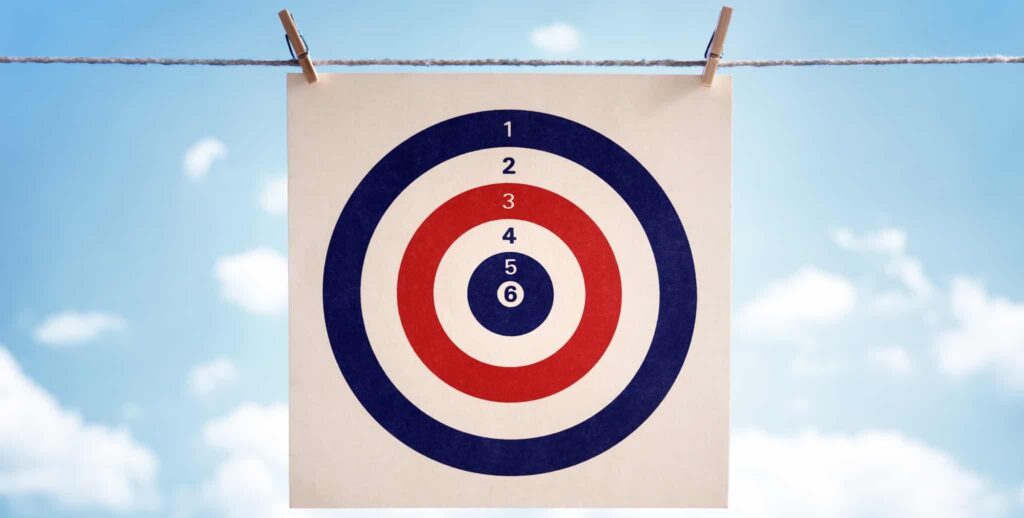This article on setting goals for small business, while written at the end of 2018/beginning of 2019 has a message that applies regardless of when you might stumble across it on the internet.
Everybody sets goals... or at least, everyone has set a goal at some point in their life. Goals can be simple like intending to run to the grocery store on your way home from the office. Goals can also be lifelong such as a "bucket list." For your business, goals are ultra important and there are hundreds of ways to approach goal building. In this article, I want to explore a very basic, simple way to get started. This is probably the lowest barrier goal building out there and is intended to get a small business person into creating healthy goals.
Creating goals for your business often follows the same path as creating a New Year's resolution. You know what you need to accomplish, you set a lofty goal, and vow to yourself that you'll hit it. For example, if you're overweight, you've probably set a goal to work out once a week and only eat healthy. Amazing, right? The problem is, if you're not already in the habit of doing that, your chances of failure is incredibly high. If you are in the habit - it isn't a goal, really. Failure is far more likely than success.
Most business owners follow the same path. They set incredibly unrealistic goals and pump themselves up at the beginning of the year that they are going to meet those goals. By June, the goals look so unrealistic that they are pushed aside and by December, they are either ignored or cause the business owner to feel a sense of failure - even if the business experienced healthy growth.
Defining S.M.A.R.T. Goals
SMART goals have been around for a very long time. I still think SMART goals are one of the best goal building systems around. The problem lies with the "R" in smart. We'll get to that in a bit, however. First it's important to define SMART goals in case you're unfamiliar with them.
SMART is an acronym for: Specific, Measurable, Assignable, Realistic, and Time-Related. You can set any goal you feel like, and if they adhere to this acronym, they are achievable. Of course, you have to be honest in your application of this. In my past, I learned this all too well. A SMART goal isn't what you THINK you should achieve. It's what you can realistically achieve based on past results.
Specific

Keep your goal specific. For example, if you own a mug manufacturing company, you might want to set a goal of selling 200,000 units by the end of the year. This is a specific goal. If you offer 4 designs, you may want to further break that specificity down to a "per design" level.
The goal of "I want to sell more products and make more money" is an amazing goal that every business owner on earth shares. There is nothing specific about that goal however. Without specificity, you have no target. Without a target, you don't know what to aim at. Without something to aim at, it's pretty darn hard to find success.
Measurable
Of course measuring goes a bit hand-in-hand with being specific. If you want to sell more mugs, that isn't really specific. If you sold 100,000 units last year and can see a clear path to selling 200,000 mugs this year, you have a goal! Guess what? Jumping from 100,000 units to 200,000 units is measuring your goal. You now know that you must not only equal last year's sales - but you must also sell 100,000 more units. It doesn't get much more measured than that!
Wapiti, for example, measures our business by two metrics: clients and retainer size. When we set specific growth goals, they encompass a number of clients in a specific monthly price-range. We may aim to get 2 or 3 clients at a large retainer value and then a dozen or so at a smaller retainer amount. Those are specific, measurable goals for Wapiti.
Assignable
If you don't know who to rely on in accomplishing your goal, it's also going to fail. If you have a company with more than a couple people, this is often your sales person or a sales team. Sometimes, as is the case with Wapiti, it lays on the shoulders of the business owner. Ultimately, it's important to know who is going to help you accomplish your goal and to ensure they are held accountable through the process.
Realistic

I could write a novel on this point. I can also summarize it quickly and succinctly: Your goals must be completely realistic. You must be truthful with yourself. Can you reach your goal based on past performance? Can you reach it based on your current team? Do you know where to start to hit that goal? If not, your goal is dumb - not SMART.
In my fictional mug manufacturer example, 200,000 units sold for the upcoming year seems like a great goal if they sold 100,000 last year. The only problem is that we don't know more of the story. To show my point, consider Mug Company A and B below:
- Mug Company A:
- 2 years old
- Sold 10,000 units in year one
- Sold 100,000 units in year two
- Mug Company B:
- 10 years old
- Sold 90,000 units in year 9
- Sold 100,000 units in year 10
Which do you think is more likely to hit the goal? This is where being realistic is important in setting goals. Of course there can always be other factors that can skew the example above. The point, however, is to ensure the goal makes sense with the data.
Time-Related
Finally, are you specific with a time in your goal? For the sake of this article, I'm mostly talking about yearly goals. That is a specific time. Within a yearly goal, however, you can have many smaller goals to step up to your yearly goal. It's important you apply a timeframe to each goal to ensure you achieve them, and in turn, hit your larger goal.

Simplifying the S.M.A.R.T. Method of Goal Setting
So now the idea of SMART goals should be pretty spelled out for you. I purposefully used a mixture of definition and example to leave out any real ambiguity. The problem is, this can still be an overwhelming process for some. I've met with clients and tried to help them with goal setting and the best answer I could get is, "I want to grow my business by the end of the year." Of course, if they have Wapiti on retainer and are paying for advertising/etc., growth could literally still be a loss for their business. Alternatively, a ton of growth can cause an unprepared business to implode.
So here's the part where I take the entire article and summarize it for easy, small business consumption:
Look at your last couple years of growth/shrinkage in your business...
- What things have changed?
- What things haven't but need to?
- Does growth even look possible (realistically built on past data) at this point?
- If so, what is a realistic number that you can push for and achieve?
It shouldn't be too easy - you don't want to meet your yearly goal in January or February. It's also important that that goal is something you can start to see happening towards the end of the year, however.
Do you see what your target could be now? Is it a SMART target or a dumb target?







